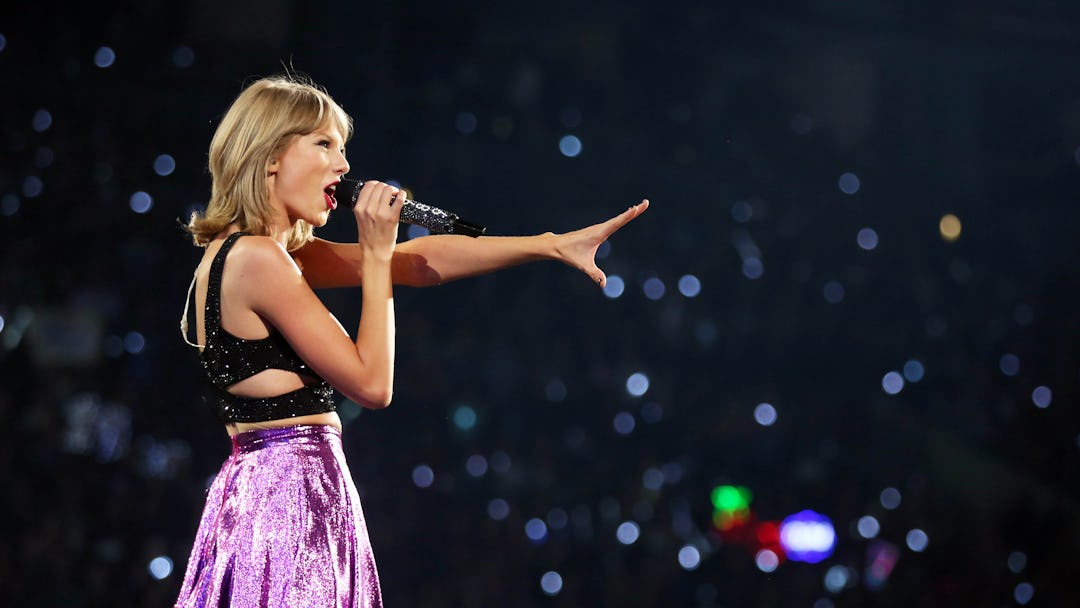The first time I laid eyes on Taylor Swift, watching one of those Grammy announcement specials she used to co-host with LL Cool J, I had a viscerally negative reaction. What was it about this young woman’s manner of expression that triggered an instant flashback to the mean girls in the middle school cafeteria, a memory of the one era of my life I would probably not return to for any amount of money? But then she took out her guitar and began to sing, and I grudgingly admitted: the song was well done, the singer talented.
Since then, I’ve maintained a bifurcated view of the rising star. Her persona continually grates: her ridiculous faux-humility and surprise, her lifeless paean to my home city of New York, her carefree-white-girl cloyingness, her studied aw-shucksness. Her songs, though (at least until recently), have landed like more meaningful creations, not mere earworms. She can craft a hook and sell it, and even make us believe she’s a T-shirt-wearing loser rather than the prom queen — at least until the last note sounds. I admit I even like the “problematic” older Swift confections. I especially like the problematic ones, if we’re being honest. “You Belong With Me” and “Love Story” are my favorite kind of pop, combining earnest storytelling with soaring catchiness, while “Blank Space” is refreshingly self-aware and playful.
Furthermore, Swift’s brilliance at spinning all her high-profile hereto-romances into chart gold never fails to satisfy my gender politics. By getting material from her exes, the artist is pioneering a form of the female gaze. And she’s recently embraced feminism and female solidarity publicly, hopefully bringing her millions of fans to Feminism 101 along with her — while flexing her power to bring Apple to its knees. What’s not to applaud about all this?
So, yes, I’ve grudgingly joined Team Taylor, and I was certainly far from grudging when I joyfully ventured out to see the singer’s 1989 tour make a light-studded stop at MetLife stadium in New Jersey this weekend. On that night, Penn Station, NJ Transit, and the football stadium’s tailgate area, were all as sober as I’ve ever seen them. Instead of the beer-swilling bros and rowdy families I’ve walked among on many an identical journey to a Springsteen show, our fellow travelers were flocks of teenage, tween, and even younger girls, a surprising majority of them blonde, most of them gazelle-legged and wearing homemade matching T-shirts with lights sewn on and carrying handcrafted signs, accompanied by moms in sundresses and makeup.
When we entered the stadium, we were given light-up bracelets “from Taylor” that would later be activated, making us part of the spectacle. (There was some concern in my group that once the bracelets were switched on, we would immediately turn into Divergent-style automatons controlled forevermore by Swift — but we donned them anyway, deciding that if they did spell the end of our existence as individual human beings with agency, at least we’d go down very entertained.) In the upper decks, the beer lines were virtually nonexistent, the costumes more and more elaborate. One mom, ushering a posse of girls in perfectly delightful DIY tie-dyed Taylor shirts, stopped to ask another where her own troupe had purchased their very professional shirts.
“We made them,” said Mom #2.
“Wow,” said Mom #1, looking askance at her own handiwork and ushering her clique of youngsters along, swiftly, in shame.
I ached for her. I wanted to say, “Taylor doesn’t care!” But I wasn’t entirely sure that was true.
Ostensibly, Taylor Swift can’t abide competition and cruelty between women, as we learned during the show, thanks to videotaped testimony from her “squad” of mostly impossibly stunning supermodels and pop stars. Women can actually support each other, they declared onscreen, as Swift changed into another sequined crop-top permutation. Now, a group of glamorous model types (plus Lena Dunham!) have every god-given right to form a “squad” and pretend to eat massive amounts of Chinese food in each other’s company — but this heartfelt message was somewhat undermined by the centrality of a Katy Perry diss track, and particularly the startling lack of body (and every other kind of) diversity in the audience. (As anyone who has ever been to a Beyoncé show can tell you, not every pop audience is necessarily monolithic.)
The two-hour-plus show itself was often ecstatically invigorating — when our bracelets lit up in time to the music, when Swift busted out her best song, and when she duetted with surprise guest Nick Jonas on the absurdly catchy “Jealous.” Reader, I danced. I sang. I cheered. I drank a terrible margarita. I “woo-wooed” and marveled at the lights.
Yet I had a tiny but persistent blank space inside me, despite it all. The calculated absence of Swift’s more heartfelt, country-tinged catalog gave the whole performance a by-the-numbers feeling, and it turned genuinely boring when Swift offered her focus-grouped patter about true love and friendship. But this may simply be a product of age: talk to nearly anyone who has a younger sister or daughter in the Swift fan universe, and they will speak of a love that is genuine — a young listener who is truly moved by the parts of Taylor’s message I find eye-roll-inducingly banal.
And that enduring fan love explains why my favorite moment of the night arrived before before Swift even stepped out, when the entire football stadium of 60,000 people, 90 percent of them female-presenting, decided to do “the wave.” This was spontaneous, energetic, utterly uncontrived, and even felt a tiny bit revolutionary in a space normally dedicated to male aggression. That succession of human ripples, more than the light show on our wrists, encapsulates everything that I support about Swift’s cult of personality. Indeed, that raw, girl-power energy that reverberated throughout the stadium bolsters the idea that Swift is something of a gateway drug to a version of sisterhood that may end up being far more subversive than even she realizes.
